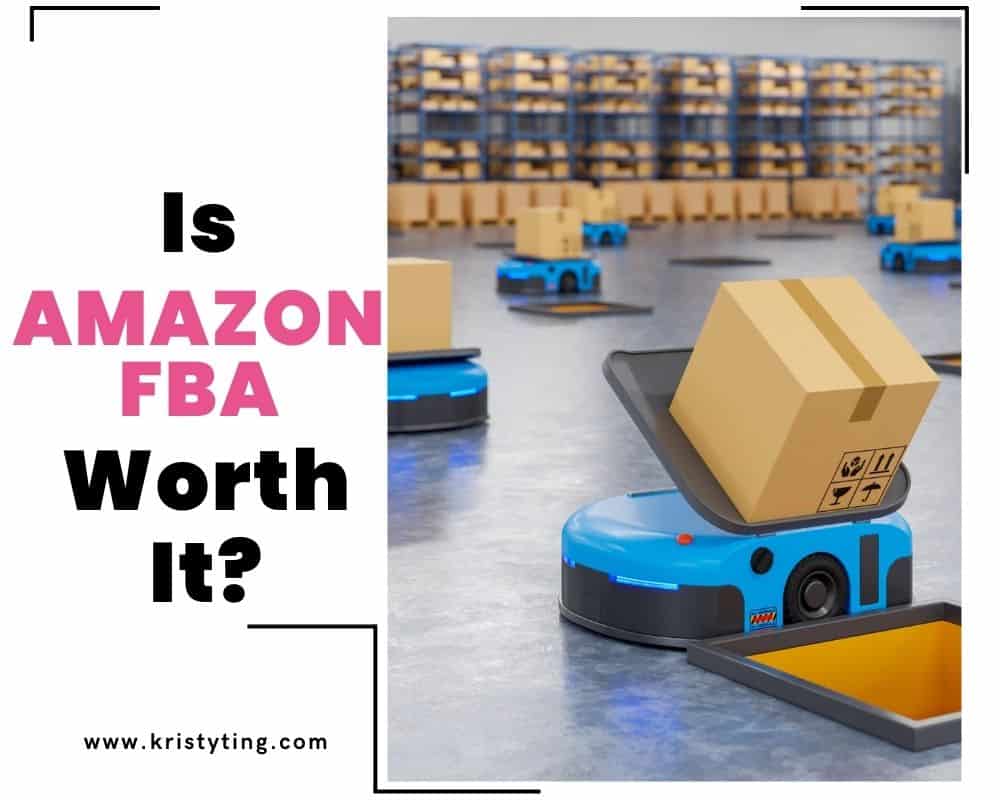This post may contain affiliate links. If you use these links to buy something we may earn a commission at no extra cost to you. Thank you for your support!
A popular claim is that you can make money with Amazon FBA from scratch. Amazon FBA stands for Fulfillment by Amazon. Amazon FBA is a service that allows you to store your products in Amazon’s fulfillment centers, and they handle the packing, shipping, and customer service for orders placed on Amazon. While this sounds incredibly convenient, there may be other aspects of Amazon FBA that you may want to take into consideration.
Is Amazon FBA worth it for freelancers, newbies, and rookie entrepreneurs? I’m inclined to say yes, and this article will explain why.
One of the main advantages of Amazon FBA is the convenience it offers. You don’t have to worry about storing and shipping your products, which can be a huge time-saver.
Additionally, Amazon’s reputation for fast and reliable shipping helps to improve your sales and customer satisfaction. Your overall pricing strategy and business plan however, should take into account FBA associated costs, such as storage fees, fulfillment fees and referral fees.
Another great thing? Amazon has this amazing cross-selling strategy, allowing your buyers to see bundle offers and similar products upon checking out to increase basket size and average transaction spend.
Ultimately, whether Amazon FBA is worth it for your business depends on your specific needs and goals. It’s important to do your research and carefully consider the costs and benefits before making a decision. In this article, we’ll explore the pros and cons of Amazon FBA and provide you with the information you need to make an informed choice.
What Is Amazon FBA And How It Works
With the Fulfillment by Amazon program, when a customer orders one of your products, Amazon picks, packs, and ships it to the customer on your behalf. They also handle any customer service inquiries and returns.
Why FBA?
This program is especially popular among third-party sellers who want to take advantage of Amazon’s massive customer base and global infrastructure. By using FBA, you can reach millions of customers without having to worry about the logistics of storing and shipping your products.
Getting Started
To get started with Amazon FBA, you’ll need to create an Amazon seller account and enroll in the FBA program. Once you’ve done that, you can create product listings and send your inventory to Amazon’s fulfillment centers. From there, Amazon takes care of the rest.
Of course, there are fees associated with using Amazon FBA. These fees include fulfillment costs, inventory storage fees, and returns processing fees. The exact amount you’ll pay depends on several factors, such as the size and weight of your products, the time of year, and the fulfillment center you’re using.
Despite the fees, many sellers find that using Amazon FBA is worth it. By outsourcing the logistics of their business to Amazon, they can focus on other aspects of their business, such as product development and marketing.
The Pros of Amazon FBA
Amazon FBA offers several benefits to businesses looking to expand their reach and streamline their operations. Here are some of the key advantages of using Amazon FBA:
Reach Amazon’s Audience
With over 300 million active users, Amazon FBA provides access to a vast audience of potential customers. This can be a great opportunity for businesses looking to reach more customers without expensive marketing campaigns. Plus, with Amazon’s advanced search algorithms and recommendation engine, your products are more likely to be discovered by interested buyers.
Borrow Amazon’s Trust
Amazon has built a reputation as a trusted online marketplace, and hundreds of millions of customers already store their credit card information with them. Amazon sellers can leverage that trust to achieve industry-high conversion rates. By using Amazon FBA, your products will be associated with the Amazon brand, which can help to build trust and credibility with potential customers.
Utilize Amazon’s Network
If you use the Amazon FBA program, your products will be shipped from Amazon fulfillment centers. This minimizes the time an Amazon seller spends on each order and maximizes their growth potential. Amazon has a vast network of fulfillment centers, which means that your products can be stored and shipped from locations that are closer to your customers, reducing shipping times and costs.
Leverage Amazon’s Workforce
An eCommerce business needs a range of functions carried out to be successful, but the Amazon FBA program takes care of many of them. Warehousing, customer support, payment processing, and more are all taken care of for every Amazon FBA seller. This means that you can focus on other aspects of your business, such as product development and marketing, while Amazon handles the logistics.
Prime Shipping and Customer Experience
By using Amazon FBA, your products will be eligible for Prime shipping, which can be a major selling point for customers. Prime customers are more likely to purchase products that are eligible for Prime shipping, which means that using Amazon FBA can help to increase your sales. Additionally, Amazon’s customer service team is available to handle any issues that may arise, which can help to improve the overall customer experience.
Here is a table summarizing the pros and cons of Amazon FBA:
| Pros | Cons |
| Reach Amazon’s vast audience | FBA fees can be expensive |
| Borrow Amazon’s trust and credibility | Limited control over the fulfillment process |
| Utilize Amazon’s vast network of fulfillment centers | Additional competition from other FBA sellers |
| Leverage Amazon’s workforce for logistics and customer support | Potential for inventory storage fees |
| Eligibility for Prime shipping and improved customer experience | Increased reliance on Amazon’s platform |
The Cons of Amazon FBA
While there are certainly benefits to using Amazon FBA, it’s important to consider the potential downsides as well. Here are some of the cons to keep in mind:
FBA Fees
One of the biggest drawbacks of using Amazon FBA is the fees. As an FBA seller, you’ll need to pay referral fees and fulfillment fees to Amazon. These fees can eat into your profit margins, especially if you don’t have a good understanding of your unit economics or deem them unimportant enough to factor into your costing. It’s important to take into account these fees when managing your pricing and make sure you’re still able to make a profit after paying them.
No Customer Data
Another huge potential downside of using Amazon FBA is that you don’t get access to customer data. Imagine selling so many things, and not being able to retarget people who abandoned their carts or launch new products to them.
The fact is while you can sell products to buyers on the Amazon marketplace, you won’t be able to collect their information and build your own audience. This means you’ll need to focus on building your own audience outside of your Amazon FBA efforts.
To someone who really puts a lot of effort into growing an email list, this is a huge minus. However, if building an email list and retargeting isn’t part of your plan now – you JUST want to get your products out there and make some money – then read on.
Competition
When you use Amazon FBA, your product listing will be displayed alongside competing products. This means you’ll need to fight for every sale, and it can be difficult to stand out from the competition. You’ll need to make sure your product is priced competitively and that your listing is optimized to attract potential buyers.
Additional Fees
In addition to the standard FBA fees, there are also a number of additional fees that you may need to pay as an FBA seller. For example, there are long-term storage fees for products that have been in Amazon’s warehouses for more than 365 days for slower moving products, as well as monthly inventory storage fees.
Shipping Costs
Depending on the size and weight of your products, sometimes it may be cheaper to handle shipping yourself or use a different fulfillment service. Make sure you compare shipping costs before deciding whether or not to use Amazon FBA.
Overall, while Amazon FBA can be a great way to sell products on the Amazon marketplace, it’s important to carefully consider the potential downsides before diving in. Make sure you have a good understanding of the fees involved and are prepared to compete with other sellers.
Profitability of Amazon FBA
So…is Amazon FBA worth it? While there are certainly costs associated with using Amazon FBA, there are also many benefits that can make it a profitable choice for your business.
If you look at it from a different perspective, the fact that Amazon FBA helps you to take care of the storage, shipping and product handling can actually turn out to be not only a huge time-saver, but save in terms of costs, too. This means you can focus on other aspects of your business, such as marketing and product development, while Amazon’s FBA services takes care of the logistics – I’d say if you product is bulky and expensive to ship out on your own, using Amazon’s logistics is easily one of the biggest advantages to using Amazon FBA.
Secondly, let’s talk about Amazon’s worth as a company. Amazon is one of the largest and most successful companies in the world, with a market capitalization of over $1 trillion. This means that Amazon has a lot of resources and can offer many benefits to its sellers, including access to a massive customer base and a wide range of tools and services to help you grow your business.
Of course, how much money you can make with Amazon FBA will depend on a variety of factors, such as the types of products you sell, your pricing strategy, and your marketing efforts. However, many sellers have been able to make a significant amount of extra money by using Amazon FBA, and some have even been able to turn it into a full-time business.
Amazon FBA for New and Small Businesses
Now that you can leverage Amazon’s vast logistics network to store, package, and ship your products directly to customers, you’ve a huge load off your back. No more worrying about inventory management, storage space issues or handling shipping logistics.
Many small businesses also choose to use Amazon FBA because it can help them compete with larger, more established businesses. Customers are easily able to check out with credit cards.
You now offer your customers fast and reliable shipping, which can help you build a loyal customer base and increase your sales.
Amazon FBA also has the potential to help online sellers and e-commerce sellers scale their businesses quickly and efficiently. As your business grows, you can easily add new products to your inventory and increase your sales volume without worrying about managing your own warehouse or hiring additional staff.
If you are just starting out in the world of e-commerce, Amazon FBA can also be a great way to learn the ropes. By using FBA, you can focus on creating great products and building your brand, while Amazon takes care of the rest.
With its many benefits and easy-to-use platform, FBA can help you achieve your business goals and build a successful online brand.
Is Amazon FBA Worth It In 2025?
If you are considering whether Amazon FBA is worth it in 2025, the answer is yes, but it depends on your situation. Amazon FBA is still a lucrative opportunity for entrepreneurs and sellers who want to leverage the vast logistics network of Amazon to reach millions of customers worldwide. However, it is not a get-rich-quick scheme and requires hard work, dedication, and a solid business plan.
Let’s do a recap.
Someone handles your storage, shipping, customer service and logistics for you.
Your buyers get fast and reliable shipping and deliveries, so important for customer satisfaction and repeat business.
Amazon is a huge worldwide business, giving you a vast customer base.
The buts? There are fees you can’t ignore – when compounded, they become hugely significant. Storage fees, fulfillment fees, and referral fees can add up quickly. This, however, is more easily overcome by factoring them into your pricing strategy.
Competition is fierce and you’ll need to stand out in a very crowded marketplace. Make sure you have a unique value proposition, competitive pricing, and a solid marketing strategy – it’s not just about posting products and expecting Amazon to do its magic.
So yes, Amazon FBA is still worth it in 2025, but it requires careful planning, hard work, and a strong business strategy and management. If you are willing to put in the effort and have a unique value proposition, Amazon FBA can be a lucrative opportunity to reach millions of customers worldwide.
Tools and Strategies for Success
To succeed in selling on Amazon FBA, you need to have the right tools and strategies in place. The following are some best practices and business strategies to help you maximize your sales and profits on the FBA platform. Let’s walk through some basic practices you’ll need to have and do before you get started.
Product Research
One of the most important aspects of selling on Amazon FBA is product research. You need to find products that are in high demand and have low competition. Jungle Scout is a powerful tool that can help you with your as it provides you with data on sales, revenue, and competition for each product.
Product Development
Once you have identified a product to sell, you need to develop it. This involves creating a high-quality product that meets the needs of your target audience. You can use a variety of tools and resources to help you with product development, such as Alibaba for sourcing products and 3D printing for prototyping.
Buy Box
To succeed on Amazon FBA, you need to win the Buy Box. The Buy Box is the box on the right-hand side of the product page that allows customers to add items to their cart. Winning the Buy Box is crucial because it increases your visibility and sales. To win the Buy Box, you need to have competitive pricing, good product reviews, and high seller metrics.
Learning Curve
Selling on Amazon FBA has a learning curve, but with the right tools and strategies, you can quickly become a successful seller. It is important to stay up-to-date with the latest trends and best practices in the industry. Joining online communities and attending conferences and events can help you stay informed and connected.
Time Management
Managing your time effectively is crucial when selling on Amazon FBA. You need to be able to manage your inventory, fulfill orders, and handle customer service inquiries. You can use tools like InventoryLab and Seller Central to help you manage your time and streamline your operations.
In short, Amazon FBA can be a highly profitable business model if you use the right tools and strategies. With product research, product development, competitive pricing, and good seller metrics, you can win the Buy Box and maximize your sales and profits. While there is a learning curve, with time management and a commitment to best practices, you can become a successful Amazon FBA seller.
Alternatives to Amazon FBA
While Amazon FBA is a popular choice for many e-commerce businesses, it may not be the right choice for everyone. Fortunately, there are several alternatives to Amazon FBA that you can consider.
Fulfillment by Merchant (FBM)
Fulfillment by Merchant, or FBM, is an alternative to Amazon FBA that allows you to fulfill orders yourself. With FBM, you store your products and fulfill orders from your own warehouse or storage facility. While FBM requires more work on your part, it gives you greater control over the fulfillment process and can be more cost-effective for some businesses.
Online Marketplaces
In addition to Amazon, there are several other online marketplaces where you can list your products. These marketplaces include eBay, Walmart, and Etsy, among others. While these marketplaces may not have the same level of traffic as Amazon, they can still be a good option for reaching new customers and diversifying your sales channels.
Own Website or Online Store
If you have your own website or online store, you can fulfill orders yourself or use a third-party logistics provider (3PL) to handle fulfillment. This option gives you complete control over the fulfillment process and allows you to build your brand and customer base.
3PL Providers
Third-party logistics providers, or 3PLs, can handle all aspects of the fulfillment process for you. This includes storing your products, picking and packing orders, and shipping them to customers. While 3PLs can be more expensive than Amazon FBA, they can be a good option for businesses that want to outsource their fulfillment operations.
Is Amazon FBA the Right Choice for You?
While Amazon FBA is a popular choice for many e-commerce businesses, it may not be the right choice for everyone. Depending on your business needs and goals, one of the alternatives listed above may be a better choice. When deciding which fulfillment option to choose, consider factors such as cost, control, and scalability.
Ultimately, the right choice will depend on your specific business needs and goals. By weighing the pros and cons of each option and choosing the one that best fits your business, you can ensure that your fulfillment operations are efficient, cost-effective, and scalable.
Conclusion
In conclusion, Amazon FBA is a great option to start your online business once you know exactly what you’re looking for and have the numbers down. So is Amazon FBA worth it? Yes, it is. It’s a great way to get your business seen without worrying about logistics – perfect for small businesses.
With Amazon FBA, you leverage Amazon’s vast customer base to reach potential customers and increase your sales. You also benefit from Amazon’s excellent customer satisfaction and customer support, which can help you build a loyal customer base.
Of course, starting an Amazon business through FBA requires hard work and dedication, but the potential rewards are well worth it. By selling your products on Amazon, you tap into the growing trend of online shopping and credit card usage. You can also benefit from Amazon’s social media and marketplace presence, which can help you reach a wider audience on Facebook and other social media platforms.
One important thing to keep in mind when using Amazon FBA is to ensure that you offer high-quality products and excellent customer support. Negative reviews can affect your business, so it’s important to address any issues promptly and professionally. You should also consider offering different products in different categories, including private label products, to diversify your offerings and reach a wider audience.
Overall, if you’re willing to put in the hard work and effort, then Amazon FBA is definitely worth considering as a way to start an online business and increase your sales.
Frequently Asked Questions
Is Amazon FBA too saturated?
While it’s true that the competition on Amazon has increased in recent years, there are still many niches and markets that are not yet saturated. Additionally, Amazon continues to grow and expand into new markets, providing opportunities for sellers to enter and succeed.
What are the fees associated with Amazon FBA?
Amazon FBA fees include fulfillment service fees, storage fees, and additional fees such as removal or disposal fees. The fees vary depending on the size and weight of the product, the selling plan chosen, and the length of time the product is stored in Amazon’s warehouses.
How does Amazon FBA compare to dropshipping?
Amazon FBA and dropshipping are two different business models. With Amazon FBA, you store your products in Amazon’s warehouses and they handle the shipping and customer service. With dropshipping, you don’t hold any inventory and the supplier ships the products directly to the customer. Both have their pros and cons, and it’s up to you to decide which model is best for your business.
What are some tools that can help with Amazon FBA?
There are many tools available to help with Amazon FBA, including Jungle Scout, Helium 10, and Sellics. These tools can help with product research, keyword research, and tracking your sales and profits.
What is the success rate of Amazon FBA?
The success rate of Amazon FBA varies depending on a number of factors, including the niche, the quality of the product, and the marketing strategy used. While there is no guarantee of success, many sellers have been able to build successful businesses using Amazon FBA.
Is Amazon FBA a good idea for beginners?
Amazon FBA can be a good idea for beginners, as it provides a platform to sell products without having to worry about shipping and customer service. However, it’s important to do your research and understand the fees and costs associated with the service before getting started.
How much money can the average Amazon FBA owner make?
The amount of money that an Amazon FBA owner can make varies depending on a number of factors, including the niche, the quality of the product, and the marketing strategy used. While some sellers have been able to make significant profits, others may only make a modest income. It’s important to set realistic expectations and understand that success on Amazon FBA requires hard work and dedication.





